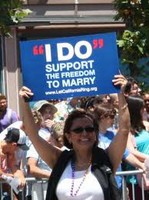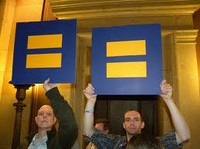Majority of New Jerseyans Favors Gay Marriage but Shows More Support for Civil Unions as an Alternative, Rutgers Poll Finds

“We were surprised by the margin favoring gay marriage, which is much greater than previously reported,” said David Redlawsk, director of the Rutgers-Eagleton Poll and professor of political science at Rutgers. “While the number of supporters has grown only a little, the number directly opposing gay marriage has fallen significantly. At the same time, more people say they are unsure or refuse to answer the question. These may be voters who are uncomfortable with gay marriage but who don’t want to express direct opposition, suggesting support is not as lopsided as it appears.”
The strong preference for civil unions as an alternative to gay marriage also suggests support for same-sex marriage is not as deep as it appears. More than two-thirds of gay marriage supporters say they support civil unions as an alternative, as do 54 percent of gay marriage opponents and 41 percent of those not sure where they stand on gay marriage.
Results are from a Rutgers-Eagleton Poll of 615 registered voters conducted among both landline and cell phone households from Aug. 9 - 15, with a margin of error for the full sample of +/- 3.9 percentage points
Support for gay marriage in New Jersey
Women are more likely than men to support gay marriage, 58 percent to 47 percent. Younger voters are supportive, but support declines with age: 77 percent of voters under 30 are in favor, while support declines to only 35 percent of voters over 65.
Support increases as levels of education increase, with 46 percent of those with high school or less, rising to 62 percent of those who have attended graduate school.
Not surprisingly, 61 percent of Democrats (and 58 percent of independents) support gay marriage; 51 percent of Republicans oppose it. Similarly, 83 percent of self-reported “liberals” and 56 percent of “moderates” favor gay marriage. In contrast, 18 percent of conservatives are for gay marriage and 61 percent are opposed.
“We see an interesting pattern, with Republicans and Conservatives much more likely to say ‘don’t know’ to the gay marriage question,” noted Redlawsk. “This suggests either some measure of uncertainty and changing attitudes by these voters, or perhaps reluctance to express a negative view in a state known for support of gay rights.”
Catholics show slightly more support for same-sex marriage than Protestants by four percentage points. How frequently respondents attend religious services is a stronger indicator of personal feelings than affiliation. Those who attend at least once a week are least likely to support gay marriage: 25 percent in favor to 60 percent opposed. Support increases with less frequent religious service attendance; 66 percent who attend a religious service once a month or less support gay marriage, while only 19 percent oppose.
New Jerseyans New York’s recent legalization of gay marriage did not affect their views. Only 14 percent of voters said they were more likely to support gay marriage after its legalization in New York, while a large majority – 73 percent – said the new law in New York had no effect on their opinion. Nearly all who were unsure about legalizing gay marriage in New Jersey – a group that might have been influenced by the New York results – also claimed that legalization of gay marriage in New York had no effect on their opinion.
Stronger support for civil unions as an alternative
Almost six-in-10 (58 percent) of respondents strongly support same-sex civil unions as an alternative to gay marriage; 26 percent oppose them. This support runs deep, with a majority within every age group supporting a civil union alternative: 57 percent of 18 to 29 year-olds, 56 percent of 30 to 49 year-olds, 61 percent of 50 to 64 year-olds and 52 percent of those 65 and over. Democrats, Republicans, and independents all support civil unions as an alternative, at 58 percent, 55 percent, and 57 percent, respectively.
“These results suggest that support for gay marriage itself is not as deep or broad as might be assumed by looking at New Jersey polls,” said Redlawsk. “What New Jersey voters do support is legal recognition of same-sex relationships. For many, if not most, civil unions fit the bill just fine as an alternative to gay marriage.”
A quarter of gay marriage supporters oppose civil unions as an alternative (14 percent of all New Jersey voters). Democrats, liberals and younger voters are all much more likely to support gay marriage than civil unions. Those with a gay family member are also more likely to prefer same-sex marriage than the civil unions. Republicans, Conservatives and older voters are all more likely to prefer civil unions.
“Opposition to civil unions comes from both ends of the spectrum,” said Redlawsk. “For some, any form of legal recognition of same-sex partners is unacceptable. For others, marriage is the only alternative they support. But most New Jerseyans fall in the middle.”

Only 2 percent of voters believe gay marriage is the most important issue the state faces; 13 percent say it is one of a few important issues. In contrast, 36 percent say legalization of gay marriage is only “somewhat important” and 46 percent believe that it is not an important issue at all. These results have changed little from a Rutgers-Eagleton Poll in early November 2009.
This view cuts across all political parties. Only 23 percent of Democrats, 14 percent of independents, and 9 percent of Republicans state that gay marriage is most important or one of a few very important issues.
Supporters of gay marriage are more likely to say it is an important issue: 72 percent see it as at least somewhat important. Opponents are much more likely to see the issue as unimportant, with 61 percent attaching no importance to the issue.
Knowing someone who is gay or lesbian increases support
Many New Jersey voters say they have gay or lesbian family members (32 percent) or friends (66 percent). These respondents are eight points more likely to support gay marriage, while those with a gay family member are 16 percentage points more supportive of gay marriage. Those with a gay family member express less support for civil unions.
Gay marriage, however, is not a top issue even for those close to someone who is gay. Only 18 percent with a gay or lesbian friend or family member say legalization of gay marriage is the most important issue or one of a few very important issues facing New Jersey today, only slightly more than those without a gay or lesbian friend of family member.
“Most voters are comfortable with the status-quo – legal civil unions – even if they say they support gay marriage,” said Redlawsk. “There seems to be little likelihood of changing the situation in New Jersey.”
Media Contact: David Redlawsk
732-932-9384, ext. 285
E-mail: redlawsk@rutgers.edu